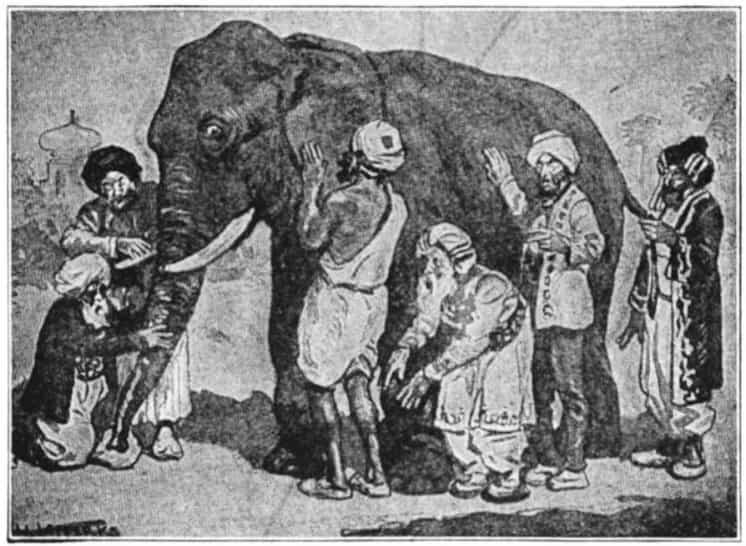Again, let’s go out of chronological order in 48a (Plato comes later as there is a dismissive attitude) and speak to a paradigm story used to radically relativise our thinking from elementary school days on.
Here, 143:
>>In a world in which abstract processes such as logical inference and explicit argument are increasingly “other” and subject to hyperskeptical side-stepping . . . a world where logic is fast joining morality in the zone of disappeared seemingly discredited “fake” knowledge (oh, the folly of neglecting and dismissing things that were so hard-bought) . . . we have to take up a narrative fight.

Take, then, certain blind men B1 to B6 in India — irony — and a narrator N1, with an elephant, E. B1 – 6 are brought up to E and each somehow only engages a part, p1 – 6, composing attempted global narratives on partial encounter. N1 then announces the somewhat comical tale and the moral becomes a paradigm of pluralism and radical relativisation of experience, insight, understanding , analysis, warrant and claimed knowledge.
It’s all over, but the shouting.
NOT.
There is a seventh man, sighted but even more self-blind, the narrator N1. He quietly takes up the implicitly objective global view and uses it to subvert the perspectives of his perceived blind inferiors. And of course, with his superior insight he at once supplants a laborious process of interaction, exchange of experiments and observations, interaction and synthesis by B1 – 6, to build up a composite picture. And, does anyone seriously doubt the reality of the subject matter, E? (Thus, truth as accurate description of E? [In a world of acid doubt and celebration of such as an intellectual virtue, [selective, hyper-]skepticism, this needs to be duly noted.])
So, we have yet again a case of self reference, inviting incoherence once the implicit objectivity of N1 is improperly used as a magic key to discredit B1 – 6. No, instead we must realise the self-reference and refrain from the relativist’s error. The denial or suggestion that there is no knowable, warranted, objective truth is subverted by the self reference of the narrator’s implied account. Sadly, this subtlety escapes ever so many, as does the reductio strategy of demonstration: assume ~H then deduce from it an absurdity, especially a self contradiction. From this emergence of principle of explosion, reject ~H, i.e. ~(~H) –> H.
Now, we can go further.
First, what if there is no true narrator, s/he is just the next blind man over, N1 = B7. On this supposition, we are then left to correct the pretence to transcend blindness, perhaps by reductio, then by exchange of experiments and observations, discussion and the like we may seek to have a more reliable overall view through analysis and correction. We may even need to clarify what it means to be sighted.
This is of course the historic Western paradigm of the community of scholarship, exploration/experiment and critically aware discussion towards objective synthesis. And to the extent that warrant is indeed established such can create an objective knowledge base that uses logically guided reasoning to compensate for and correct biases. Obviously, open ended and ideally self-correcting. However, prone to captivity of skeptical ideologies.
Another possibility is the existence of a genuine global narrator, N*. Learning to calibrate such and its narrative and granting it trust on establishment of reliability and insight is a major exercise in a cynical, hyperskeptical age. Hence, Plato’s parables of the cave and the ship of state.
(It is not coincidental that certain objectors were very dismissive towards these parables, they expose key gaps in preferred narratives. As for the story of Epictetus and his interlocutor on necessity and branch on which we sit pervasiveness of logic, the concept of pervasive, antecedent, self evident first principles is so alien to the current conventional wisdom that it is routinely side stepped. But it is plain that we need to address cogently paradigmatic real world yardstick cases and related pivotal thought exercises.)
So, there is more to the story than meets the eye.>>
The six blind men and the elephant plus narrator may make relativising of knowledge, truth, morality etc SEEM plausible but actually fails to establish this. END
PS, as usual, no comments, 48a continues.